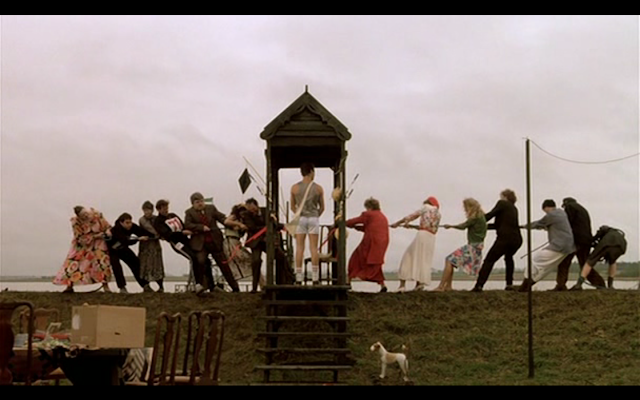I was introduced to this film after telling my friend Ukko about a dinner party I planned to hold in a field in summer. It would go something like this: lush, violent green grass, dotted with a few gargantuan Moreton Bay Figs, ground-lit, warm, balmy, insect-filled air and a dinner table, raised some feet off the ground, with more than ten guests perched atop tennis umpire chairs. I was told it was like something out of a Peter Greenaway film. Then we watched this. It is simply rad.
The film is about games, rituals, methods. The plot is less important than the curling, meandering way in which human foibles, and the systems we create, are explored. So arbitrary are the absurd conventions of these lotus-eaters that they lend a magnifying glass to our own rituals, practises, customs. Are we not equally absurd? Folly, frivolity, flippancy have never been so carefully woven into games that are so heedlessly played. Perhaps the nicest thing about this film is the richness and fulness of a world devoid of neuroticism and overly-psychoanalytic-self-reflective-mawkishness. Socrates told us that the unexamined life is not worth living, and perhaps this film shows us that examining, magnifying, classifying are worthwhile pursuits, but the plumpness and fat-suckling-pig-ness of life comes from pursuing life, and not your neuroses.
Foucault, in his 'The Order of Things', writes about a passage in Borges:
"The passage quotes a 'certain Chinese encyclopaedia' in which it is written that 'animals are divided into: (a) belonging to the Emperor, (b) embalmed, (c) tame, (d) sucking pigs, (e) sirens, (f) fabulous, (g) stray dogs, (h) included in the present classification, (i) frenzied, (j) innumerable, (k) drawn with a very fine camelhair brush, (l) et cetera, (m) having just broken the water pitcher, (n) that from a long way off look like flies'....
It is not the 'fabulous' animals that are impossible, since they are designated as such, but the narrowness of the distance separating them from (and juxtaposing them to) the stray dogs, or the animals that from a long way off look like flies. What transgresses the boundaries of all imagination, of all possible thought, is simply that alphabetical series (a, b, c, d) which links each of those categories to all the others....
It appears that certain aphasiacs, when shown various differently coloured skeins of wool on a table top, are consistently unable to arrange them into any coherent pattern; as though that simple rectangle were unable to serve in their case as a homogenous and neutral space in which things could be placed so as to display at the same time the continuous order of their identities or differences as well as the semantic field of their denomination. Within this simple space in which things are normally arranged and given names, the aphasiac will create a multiplicity of tiny fragmented regions in which nameless resemblances agglutinate things into unconnected islets; in one corner they will place the lightest-coloured skeins, in another the red ones, somewhere else those that are softest in texture, in yet another place the longest, or those that have a tinge of purpose or those that have been wound up into a ball. But no sooner have they been adumbrated than all these groupings dissolve again, for the field of identity that sustains them, however limited it may be, is still to wide not to be unstable; and so the sick mind continues to infinity, creating groups then dispersing them again, heaping up diverse similarities, destroying those that seem clearest, splitting up things that are identical, superimposing different criteria, frenziedly beginning all over again, becoming more and more disturbed, and teetering finally on the brink of anxiety."
Michel Foucault; Les Mots et les Choses / The Order of Things









